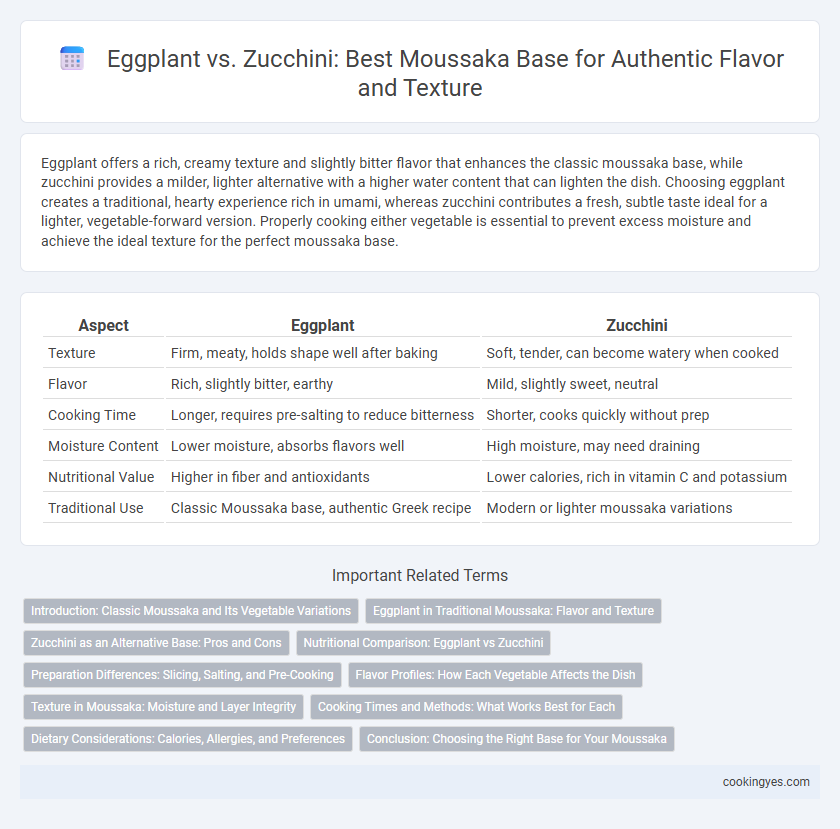Eggplant offers a rich, creamy texture and slightly bitter flavor that enhances the classic moussaka base, while zucchini provides a milder, lighter alternative with a higher water content that can lighten the dish. Choosing eggplant creates a traditional, hearty experience rich in umami, whereas zucchini contributes a fresh, subtle taste ideal for a lighter, vegetable-forward version. Properly cooking either vegetable is essential to prevent excess moisture and achieve the ideal texture for the perfect moussaka base.
Table of Comparison
| Aspect | Eggplant | Zucchini |
|---|---|---|
| Texture | Firm, meaty, holds shape well after baking | Soft, tender, can become watery when cooked |
| Flavor | Rich, slightly bitter, earthy | Mild, slightly sweet, neutral |
| Cooking Time | Longer, requires pre-salting to reduce bitterness | Shorter, cooks quickly without prep |
| Moisture Content | Lower moisture, absorbs flavors well | High moisture, may need draining |
| Nutritional Value | Higher in fiber and antioxidants | Lower calories, rich in vitamin C and potassium |
| Traditional Use | Classic Moussaka base, authentic Greek recipe | Modern or lighter moussaka variations |
Introduction: Classic Moussaka and Its Vegetable Variations
Classic moussaka traditionally features layers of sliced eggplant, prized for its rich, creamy texture that absorbs the spiced meat sauce and bechamel beautifully. Zucchini offers a lighter, less oily alternative with a subtle flavor, making it a popular choice in variations aimed at reducing calorie content and enhancing moisture balance. Both vegetables provide unique textures and nutritional profiles, influencing the overall taste and authenticity of the moussaka experience.
Eggplant in Traditional Moussaka: Flavor and Texture
Eggplant is the traditional base for classic moussaka, prized for its rich, slightly bitter flavor and creamy texture when baked, which absorbs the layers of spiced meat sauce and bechamel beautifully. Its meaty firmness holds up well under the weight of ingredients, contributing to the dish's hearty consistency. Unlike zucchini, eggplant provides a depth of umami that defines the authentic Mediterranean taste of moussaka.
Zucchini as an Alternative Base: Pros and Cons
Zucchini serves as a lighter, lower-calorie alternative to eggplant in moussaka, offering a milder flavor and tender texture that absorbs spices well. It provides quicker cooking times and retains more moisture, which can result in a less dense dish compared to traditional eggplant layers. However, zucchini's higher water content may lead to a slightly soggier moussaka base, requiring careful preparation to avoid excess moisture and maintain structural integrity.
Nutritional Comparison: Eggplant vs Zucchini
Eggplant contains more fiber and antioxidants like nasunin, which supports heart health, while zucchini offers higher vitamin C and potassium levels for enhanced immune function and muscle support. Both vegetables are low in calories and carbohydrates, making them ideal for a nutritious Moussaka base. Choosing eggplant provides a richer flavor and denser texture, whereas zucchini contributes a lighter, moister consistency to the dish.
Preparation Differences: Slicing, Salting, and Pre-Cooking
Eggplant for moussaka requires slicing into uniform rounds, salting to remove bitterness and excess moisture, then roasting or frying to achieve a tender texture, which enhances the final dish's flavor and consistency. Zucchini, with its higher water content, demands thinner slices and thorough pre-cooking, often through sauteing or grilling, to prevent sogginess and maintain structural integrity in the layers. These preparation differences significantly affect the moisture balance and mouthfeel of the moussaka base, influencing the overall culinary experience.
Flavor Profiles: How Each Vegetable Affects the Dish
Eggplant provides a rich, slightly bitter flavor with a creamy texture that absorbs the spices and tomato sauce, creating a robust and traditional moussaka base. Zucchini offers a milder, more delicate taste with higher water content, resulting in a lighter, less intense flavor that highlights other ingredients without overpowering them. Choosing eggplant enhances depth and authenticity, while zucchini delivers a fresher, subtler profile that can appeal to those seeking a lighter alternative.
Texture in Moussaka: Moisture and Layer Integrity
Eggplant provides a creamy texture and holds moisture well, enhancing the rich, layered structure of traditional moussaka without becoming soggy. Zucchini, with its higher water content, tends to release excess moisture during baking, which can compromise layer integrity and create a less cohesive dish. For optimal texture and moisture balance, eggplant remains the preferred base in authentic moussaka recipes.
Cooking Times and Methods: What Works Best for Each
Eggplant for moussaka requires salting and roasting or frying to remove excess moisture and bitterness, typically cooking for 20-30 minutes until tender and slightly caramelized. Zucchini, with higher water content, demands pre-salting and either pan-frying or roasting for about 15-20 minutes to achieve a firmer texture that won't make the dish soggy. Optimal results depend on controlling moisture and achieving a balanced texture, with eggplant offering a richer flavor and zucchini providing a lighter, faster-cooking alternative.
Dietary Considerations: Calories, Allergies, and Preferences
Eggplant serves as the traditional base for moussaka, offering a lower-calorie option with approximately 25 calories per 100 grams, while zucchini contains about 17 calories per 100 grams, making it slightly lighter for calorie-conscious diets. Eggplant is rich in fiber and antioxidants but may trigger allergies or digestive discomfort in sensitive individuals, whereas zucchini is generally hypoallergenic and better tolerated. Preferences for taste and texture vary, with eggplant providing a denser, more robust flavor and zucchini delivering a milder, more tender alternative suitable for low-calorie and allergy-sensitive dietary needs.
Conclusion: Choosing the Right Base for Your Moussaka
Eggplant offers a rich, creamy texture and traditional flavor that enhances the authentic taste of moussaka, while zucchini provides a lighter, slightly sweeter alternative with lower calories. For a classic dish, eggplant remains the preferred base, complementing the spiced meat and bechamel sauce perfectly. However, zucchini is ideal for a healthier, fresher twist without sacrificing moisture or structure.
Eggplant vs Zucchini for Moussaka Base Infographic

 cookingyes.com
cookingyes.com